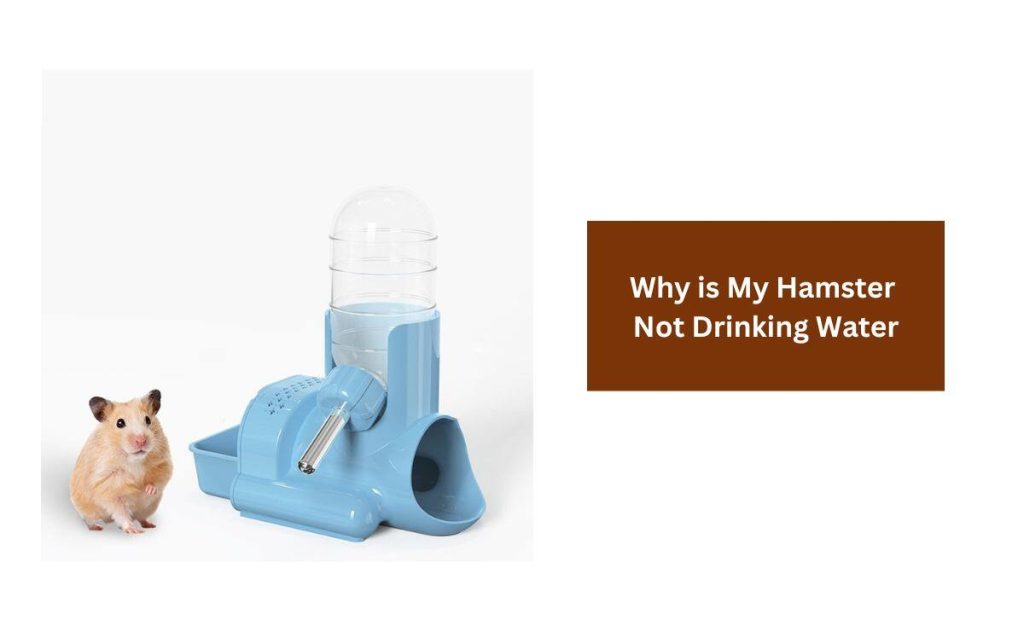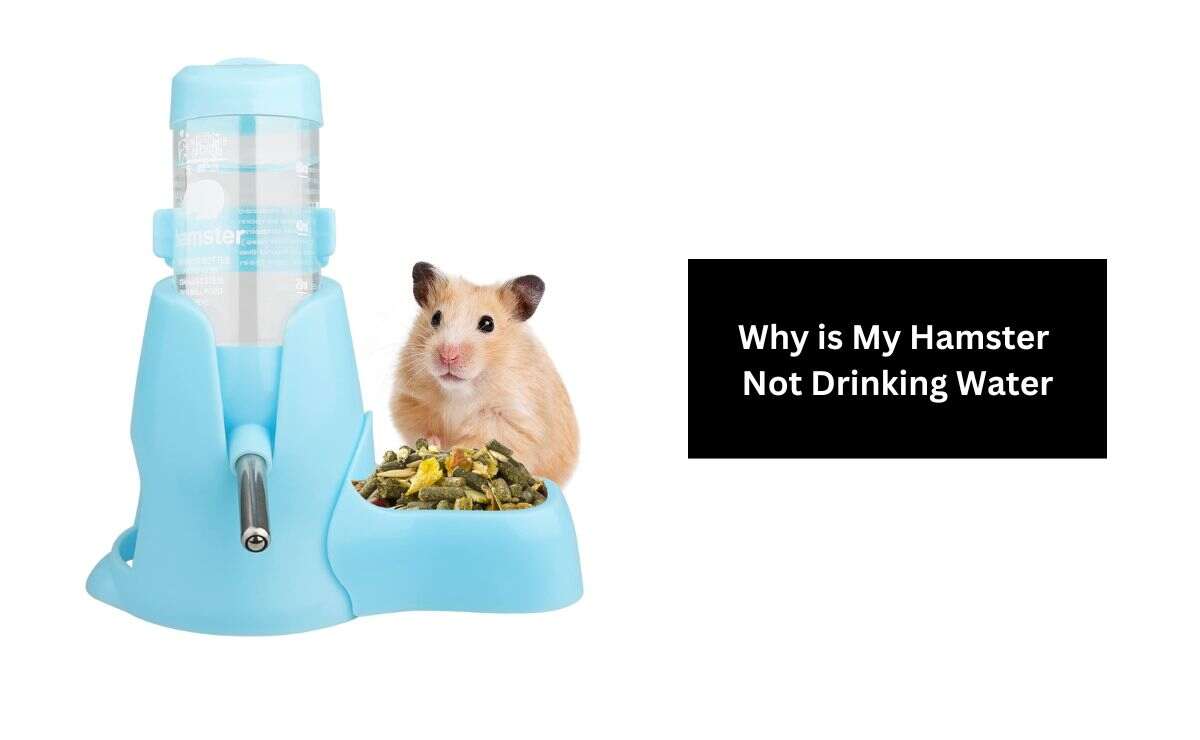Picture this: your adorable little ball of fur, your beloved hamster, is running on its wheel, nibbling on treats, and having a grand old time. But wait! Something seems off. You notice that its water bottle remains untouched, as if it’s playing a game of “Let’s See How Long I Can Go Without Drinking.
” So, why is my hamster not drinking water? Let’s dive into this curious mystery and unravel the potential reasons behind this adorable creature’s unusual behaviour.
Why is My Hamster Not Drinking Water?

It’s important to consider the cleanliness of your hamster’s water source. Just like us, hamsters prefer fresh and clean water. If the water in their bottle appears murky or has debris floating around, it’s no wonder they’re avoiding it. Make sure to change their water regularly and clean the bottle thoroughly to keep it enticing and hygienic for your furry friend.
Remember, hamsters have delicate senses, so a bit of extra effort to maintain their water supply can go a long way! Another reason your hamster might be turning its nose up at the water bottle could be due to a preference for alternative sources of hydration.
However, there are many potential causes for a hamster not getting enough water, including Dental Disorders, Factors Affecting Hamster Water Intake, Insufficient Water Accessibility, and Potential Health Issues and Symptoms to Watch for.
Reasons Behind Hamsters Not Having Enough Water
Hamsters don’t drink enough water for a number of distinct reasons. Let’s analyse the likely causes:
Factors Affecting Hamster Water Intake
Various factors such as age, diet, temperature, and activity levels can significantly influence a hamster’s water intake, emphasising the need for careful observation and appropriate adjustments to ensure their hydration needs are met.
Insufficient Water Accessibility and Placement
Inadequate access to water, such as incorrect bottle positioning or lack of additional water sources, can lead to reduced water intake in hamsters, potentially resulting in dehydration and related health complications. It is crucial to ensure easy access and proper placement of water containers within their enclosure.
Potential Health Issues and Symptoms to Watch for
Hamsters are susceptible to dehydration, urinary tract infections, and other health problems if their water intake is insufficient. Symptoms like lethargy, dry mouth, sunken eyes, and changes in urine concentration should be closely monitored to detect and address potential issues promptly.
The Impact of Environmental Stress on Water Consumption
Hamsters, being sensitive creatures, can experience decreased water consumption due to environmental stressors like excessive noise, improper temperature, or the presence of predators. Maintaining a calm and comfortable environment can help encourage regular water intake and prevent dehydration.
Dental Disorders
Dental problems, including overgrown teeth, misalignment, or tooth root infections, can hinder a hamster’s ability to drink water adequately. Regular dental care, appropriate chew toys, and a balanced diet are crucial in preventing such disorders and ensuring proper water intake for overall well-being.
What Should You Do When Your Hamster Doesn’t Have Enough Water?
Let’s look into the possible solutions:
Ensuring Proper Water Accessibility and Placement
Place water bottles at an appropriate height for the hamster to reach easily, ensuring the spout is not blocked, and check daily to ensure bottles are functioning and providing a steady flow of fresh water.
Checking for Potential Water Contamination or Spoilage
Regularly inspect water bottles and dishes for any signs of algae, mould, or debris, cleaning them thoroughly and replacing water if it appears dirty or contaminated.
Offering Variety in Water Sources
In addition to a water bottle, provide a shallow dish of fresh water to give the hamster options, as some may prefer drinking from a dish rather than a bottle.
Addressing Environmental Stressors and Disturbances
Minimise loud noises, sudden temperature changes, and other stressors in the hamster’s environment to promote a calm and comfortable atmosphere, encouraging regular water consumption.
Evaluating and Adjusting the Hamster’s Diet
Ensure the hamster’s diet consists of fresh, moisture-rich foods such as fruits and vegetables, while avoiding excessive amounts of dry food, as a balanced diet can contribute to proper hydration.
Promoting Hydration through Moist Foods and Treats
Offer hydrating treats like cucumbers, watermelon, or low-sugar fruits to supplement the hamster’s water intake, ensuring they receive additional moisture through their diet.
Encouraging Play and Exercise to Stimulate Thirst
Provide opportunities for physical activity and mental stimulation through toys, exercise wheels, and playtime outside of the enclosure to stimulate the hamster’s thirst and encourage increased water consumption.
Seeking Veterinary Advice and Examination
If you notice persistent changes in water intake, signs of dehydration, or any concerning symptoms, consult a veterinarian for a thorough examination and professional guidance to address any underlying health issues affecting the hamster’s water consumption.
The Role of Proper Water Intake in Hamsters
Understanding the Essential Role of Water
Water plays a vital role in maintaining overall health by facilitating nutrient absorption, regulating body temperature, supporting organ function, and promoting proper digestion in hamsters.
Dehydration Risks
Exploring the Potential Consequences of Insufficient Water Intake in Hamsters: Insufficient water intake can lead to dehydration in hamsters, which may result in lethargy, dry mouth, electrolyte imbalances, and even organ failure if left untreated. Providing adequate water is crucial for their well-being.
Maintaining Optimal Body Functions
How Water Supports Digestion, Temperature Regulation, and Organ Health in Hamsters: Sufficient water intake aids in the digestion process, helps regulate body temperature, and ensures proper organ function, including kidney health, in hamsters, promoting their overall physiological well-being.
Preventing Health Complications
The Link Between Proper Hydration and the Prevention of Urinary Tract Issues and Kidney Problems in Hamsters: Adequate water intake plays a crucial role in preventing urinary tract infections and kidney problems in hamsters, as it helps flush out toxins, maintain urine concentration, and support the optimal function of these vital systems.
Step-by-step Checklist for Making Sure Your Hamster Has Access to Enough Water
Step 1:
Assessing the Possible Causes: Identifying Factors Contributing to Reduced Water Intake in Hamsters
- Check the water source for cleanliness and freshness.
- Consider the type of water dispenser (bottle or bowl) and try different options.
- Ensure the water dispenser is easily accessible and located in a quiet area.
- Evaluate the cage size, bedding, and enrichment for any potential stressors.
- Look for signs of illness or pain that may be affecting water consumption.
Step 2:
Implementing Practical Solutions: Strategies to Encourage and Facilitate Hydration in Hamsters
- Offer fresh foods with high water content, such as cucumber or watermelon.
- Provide hydration treats designed for small animals.
- Place multiple water dispensers in different areas of the cage.
- Soak dry food in water before feeding it to your hamster.
- Sprinkle a small amount of water on the bedding to create a slightly moist area.
Step 3:
Seeking Veterinary Guidance: When and How to Involve a Professional in Resolving Insufficient Water Consumption
- If the hamster’s water intake doesn’t improve or if other concerning symptoms are present, seek veterinary guidance.
- Find a veterinarian specializing in exotic animals or small mammals.
- Be prepared to provide information about your hamster’s behaviour, diet, and any other relevant details.
- The veterinarian may perform tests to determine underlying medical conditions causing reduced water intake.
- Remember, involving a professional is important if you have concerns about your hamster’s health and water intake.
Conclusion
Well, if your hamster isn’t drinking water, and you are bothered about “why is my hamster not drinking water?”, maybe it’s secretly on a mission to invent a new hydration trend or plotting to become a desert-dwelling superhero.
Either way, keep an eye out for alternative water sources and consult a vet to ensure your little friend stays hydrated and out of trouble!
